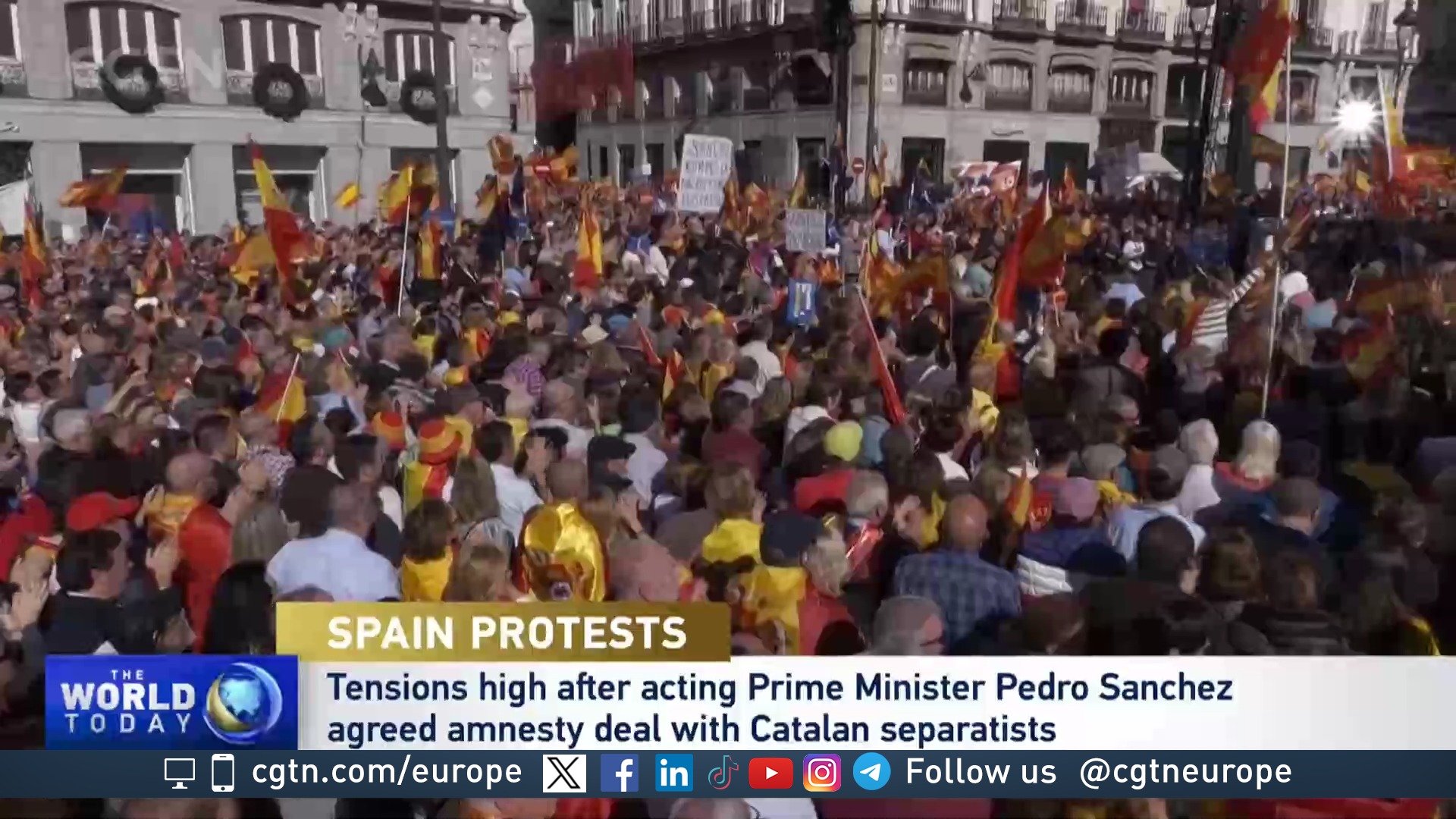02:08

"Traitor, felon, 'Sanchez and Puigdemont to prison."
These were just some of the messages on show on the streets of Spain as tens of thousands of angry protesters rallied across Spain to voice their opposition to an amnesty deal agreed on Thursday which means Catalan separatists will be allowed to return to the country.
In Madrid the government estimated 80,000 people were on the street, while the organizers - the center-right People's Party - said there were as many as 500,000 people, with politicians calling for new elections and even threatening a general strike. The deal will allow exiled Catalan leaders to come back to Spain, including Carles Puigdemont, one of the chief architects of the 2017 independence referendum, deemed illegal by the central Spanish government at the time.
In return for the amnesty agreement, acting Spanish Prime Minister Pedro Sanchez now has a parliamentary majority to form a government as Puigdemont's JUNTS party throws their support behind a broad coalition government. The fact that Puigdemont and others will likely be able to come home has infuriated the right of Spain's deeply divided body politic.
'Dictator'?
The center-right People's Party won the most votes in the July 23 general election, but fell short of a majority, even in coalition with far-right party VOX. As a result the right wing could not form a government and now many of their supporters are furious that Sanchez has done a deal with the biggest Catalan independence party and the Basque equivalent BILDU.

People take part in a protest near Spain's Socialists Party headquarters, after Spain's socialists reached a deal with the Catalan separatist Junts party for government support, a pact which involves amnesties for people involved with Catalonia's failed 2017 independence bid. /Susana Vera/Reuters
People take part in a protest near Spain's Socialists Party headquarters, after Spain's socialists reached a deal with the Catalan separatist Junts party for government support, a pact which involves amnesties for people involved with Catalonia's failed 2017 independence bid. /Susana Vera/Reuters
Prominent voices on the right repeatedly say that Sanchez has allied himself with separatists and 'terrorists.'
"He's a dictator," Marta Garcia, a health worker with a Spanish flag tied around her neck, tells CGTN in Madrid's central Plaza de Sol on Sunday. "He got into power and now he won't leave. He doesn't care about democracy or the country."
READ MORE
Protests: Why Europe is split over Israel-Gaza war
China's Su Yiming is 'ready for World Cup season'
"This is a shame for the country," Juan-Manuel Chueca, a partner in a consultancy firm tells CGTN, "a humiliation."
"Nobody should be above the law, you can't impose this on Spaniards. You can't go against the law and then be forgiven just because the prime minister wants to stay in power," he added.
Similar scenes played out, with similar opinions expressed, across many regional capitals in Spain such as Seville, Granada, Valencia, Malaga and even Barcelona.
A progressive coalition
Meanwhile, Spain's left edges ever-closer to a new four-year mandate.
"Let me confirm it to you, loud and clear. Spain will once again have a progressive coalition government for the next four years. And the government will be headed by the Spanish Socialist Workers' Party," a confident Sanchez told a crowd in Malaga.
He also asked the country's right wing to tone down its "hate speech" and to act in a "sane and measured way" as he set out his vision for the next four years.
"This is an agreement to strengthen the welfare state; an agreement to materialize the constitutional right to grant access to a dignified home; an agreement to fight against the climate emergency; an agreement to consolidate Spain's territorial diversity, to create a space for reunion and coexistence," he said.
What happens next?
The amnesty law is set to be brought before Congress on Monday and with the majority that Sanchez has now since securing the support of separatist parties, it's likely to pass. Then a confirming legislative vote should take place on Wednesday or Thursday when a Socialist Workers' Party-led government will likely be confirmed, along with another four-year mandate for Sanchez.
Spain's right wing and other opponents of the deal, however, have vowed to fight such an outcome both in the streets and in parliament, with opposition also coming from the Senate. All signs point to a Sanchez government succeeding, but the backdrop will be one of angry noise, demonstrations, and furious opposition.

Subscribe to Storyboard: A weekly newsletter bringing you the best of CGTN every Friday